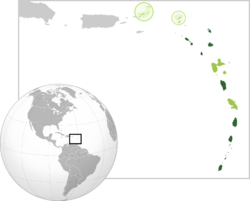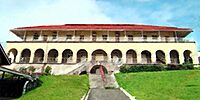Organisation of Eastern Caribbean States facts for kids
Quick facts for kids
Organisation of Eastern Caribbean States
Organisation des États de la Caraïbe orientale (French)
|
|
|---|---|

Protocol member Associate member
|
|
| Commission | Castries |
| Working languages | |
| Type | Political and economic union |
| Membership |
7 protocol
5 associate
|
| Leaders | |
|
• Chairman
|
Ralph Gonsalves |
|
• Director-General
|
Didacus Jules |
| Establishment | |
|
• Treaty of Basseterre
|
18 June 1981 |
|
• Revised Treaty of Basseterre
|
21 January 2011 |
| Area | |
|
• Total
|
2,709 km2 (1,046 sq mi) |
|
• Including Associate Members
|
5,910 km2 (2,280 sq mi) |
| Population | |
|
• 2017 estimate
|
|
|
• Including Associate Members
|
1,465,689 |
|
• Density
|
215.6/km2 (558.4/sq mi) |
| GDP (nominal) | 2017 estimate |
|
• Total
|
|
|
• Per capita
|
|
| Currency |
3 currencies
East Caribbean Dollar (Protocol members and Anguilla)
US Dollar (British Virgin Islands) Euro (Guadeloupe, Martinique) |
| Time zone | UTC-4 (AST) |
| Internet TLD | |
The Organisation of Eastern Caribbean States (OECS) is a team of countries and territories in the Eastern Caribbean. These islands work together to improve their economies, protect people's rights, and support each other.
The OECS also helps its members prepare for and recover from natural disasters, like hurricanes. The main office, called the Commission, is in Castries, the capital of Saint Lucia.
Many OECS members are part of an economic union, which is like a club that makes it easier to trade and do business with each other. Eight of these members also share the same money, the Eastern Caribbean dollar.
Contents
History of the OECS
The OECS was formed on June 18, 1981. The countries signed an agreement called the Treaty of Basseterre, named after the capital city of St. Kitts and Nevis. The OECS replaced an older group called the West Indies Associated States.
The member countries realized they could achieve more by working together. This cooperation has helped them grow stronger as a group.
Most members of the OECS are also part of a larger group called the Caribbean Community (CARICOM). They joined a special CARICOM program to make trade and business even easier across the wider Caribbean region.
Special Projects of the OECS
The OECS works on many projects to bring its members closer together. Two of the biggest projects have been about creating a common passport and an economic union.
A Common Passport
Around 2003, the OECS planned to create a special passport for its citizens. However, a bigger plan for a CARICOM passport was also in the works.
The OECS leaders decided to wait and see if the CARICOM passport would be ready. In 2005, the first CARICOM passports were issued. Because of this, the OECS decided to drop its own passport plan and join the larger CARICOM system.
Creating an Economic Union
In 2001, OECS leaders decided to form an economic union. This was a big step to make their economies work as one. The goal was to allow goods, services, and people to move freely between member countries, much like in the European Union.
The New Rulebook
To make the economic union happen, the OECS needed a new set of rules. They updated their original agreement and created the Revised Treaty of Basseterre in 2010. This new treaty officially established the OECS Economic Union in 2011.
The treaty created a single space where:
- Goods and services can be traded easily.
- People can travel, live, and work in any member country without special permits.
- Money and investments can move freely between the islands.
This union helps businesses grow and gives people more opportunities.
Who are the Members?
The OECS has twelve members. They form an arc of islands in the Caribbean Sea. There are two types of members: full members and associate members.
Seven countries are full members. They were the original founders of the OECS. Five territories are associate members. They participate in many OECS activities but are not involved in everything.
Many of the members were once colonies of the United Kingdom. Today, some are independent countries, while others remain overseas territories of the UK or France.
| State | Status | Capital | Joined | Pop.
(2017) |
Area
(km²) |
Currency | Official Language |
|---|---|---|---|---|---|---|---|
| Member | St. John's | Founder | 91,244 | 443 | EC$ | None | |
| Member | Roseau | Founder | 70,693 | 751 | EC$ | English | |
| Member | St. George's | Founder | 107,541 | 344 | EC$ | English | |
| Member | Brades | Founder | 4,993 | 102 | EC$ | English | |
| Member | Basseterre | Founder | 55,411 | 261 | EC$ | English | |
| Member | Castries | Founder | 175,498 | 617 | EC$ | English | |
| Member | Kingstown | Founder | 110,185 | 389 | EC$ | English | |
| Associate Member | The Valley | 1995 | 15,253 | 96 | EC$ | English | |
| Associate Member | Road Town | 1984 | 35,015 | 151 | US$ | English | |
| Associate Member | Basse-Terre | 2019 | 393,640 | 1,628 | Euro | French | |
| Associate Member | Fort-de-France | 2015 | 374,780 | 1,128 | Euro | French |
Future Members
Over the years, other Caribbean islands have shown interest in joining the OECS. These include the United States Virgin Islands and the Dutch Caribbean islands of Saba and Sint Maarten. So far, they have not become members, but they sometimes join in on OECS meetings.
How the OECS is Organized
The OECS has several important parts that help it run smoothly. These include a main office, a central bank, and a court system.
The Commission
The main office of the OECS is called the Commission, but it is also known as the Secretariat. It handles the daily work of the organization. The leader of the Commission is the Director General. The current Director General is Dr. Didacus Jules.
The Commission helps member countries work together on big challenges like global trade. It has offices in several countries to manage its different projects.
The Central Bank
Most OECS members use the same currency, the East Caribbean dollar. This money is managed by the Eastern Caribbean Central Bank (ECCB). The bank's job is to keep the currency stable and make sure the banking system is safe and strong.
The British Virgin Islands, Guadeloupe, and Martinique are the only OECS members that do not use the East Caribbean dollar.
The Supreme Court
The Eastern Caribbean Supreme Court (ECSC) is the highest court for OECS member states. If a legal case is not solved in a country's local court, it can be appealed to the ECSC. For very important cases, the final appeal can go to a court in the United Kingdom called the Judicial Committee of the Privy Council.
Security and Safety
The OECS countries work together to keep the region safe. They are part of a group called the Regional Security System (RSS). This system helps the islands with police and military matters. The RSS is based in Barbados and gets support from countries like the United States and Canada.
Health Services
The OECS helps its members get affordable medicine through the Pharmaceutical Procurement Service. This service buys medicine and medical supplies in large amounts for all the member states. By buying in bulk, it saves the countries millions of dollars each year.
Symbols of the OECS
The OECS has its own flag and logo. The design is on a light green background. It features a circle of orange and white triangles pointing in and out. This symbol represents the member countries working together in unity.
See also
- Association of Caribbean States
- Caribbean Community
- List of Indigenous Names of Eastern Caribbean Islands
- Regional Security System
 | Leon Lynch |
 | Milton P. Webster |
 | Ferdinand Smith |





